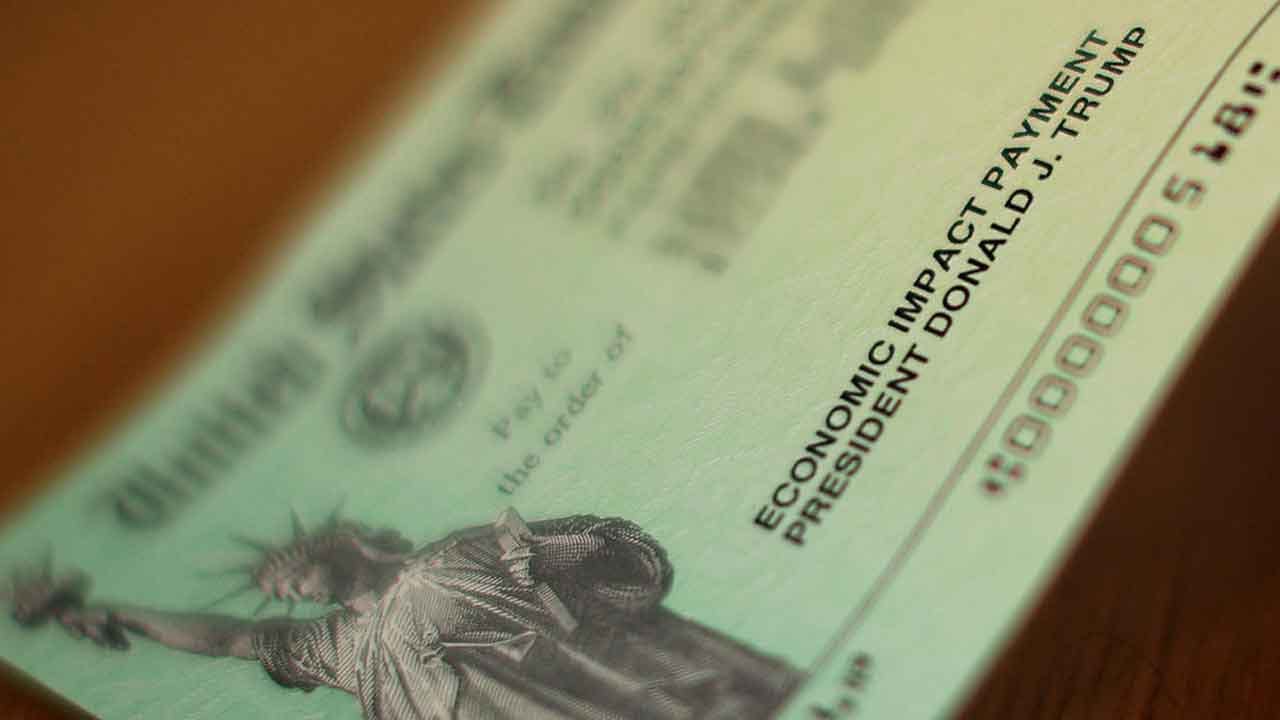What's The Status Of A Second $1,200 Stimulus Check?

For months, millions of Americans grappling with the economic fallout of the coronavirus pandemic have been pinning their hopes on Congress delivering another round of financial relief, including direct cash payments and an extension of enhanced unemployment benefits. But the door for such assistance — slammed shut by President Donald Trump last week only for him to nudge it ajar later that day — may remain open.
Mr. Trump is backing a revised stimulus package, according to White House economics adviser Larry Kudlow. Kudlow didn't provide specifics about the relief plan, although he noted it would likely include stimulus checks as well as aid for the ailing airline industry.
"I don't want to walk through the details because [Treasury Secretary Steven] Mnuchin and Speaker Pelosi will be on the horn this afternoon" to negotiate the package, Kudlow said.
Mr. Trump himself later urged Congress to pass a stimulus bill. "Go big or go home!!!" he tweeted on October 13.
That's a reversal from Mr. Trump's position earlier this week, when he pushed for a more limited series of separate measures: stimulus checks, $25 billion in aid for airlines and $135 billion in fresh loans for small businesses.
Yet House Speaker Nancy Pelosi, who is championing a broader $2.2 trillion package passed by Democrats in the lower chamber last week, on Wednesday scoffed at the president's idea of targeted relief. "Secretary Mnuchin came back to the negotiating table, and this weekend, the Administration issued a proposal that amounted to one step forward, two steps back. In fact, in some instances, it makes matters worse," Pelosi said.
Economists warn that failing to inject another dose of fiscal stimulus could stall the recovery, given the ongoing pandemic and economic headwinds. Job growth around the U.S. is slowing as big businesses continue to lay off workers, with the airline industry cutting tens of thousands of jobs this month.
"Without faster job growth — unlikely at this stage of the recovery — or increased fiscal aid, households, businesses, and state and local governments will be increasingly susceptible to a deterioration of the health situation," noted Gregory Daco, chief U.S. economist at Oxford Economics.
"Spreading political mess"
Prior to the Friday's negotiations, Wall Street analysts had said the odds of reaching a compromise on either a broad package or more limited measures, such as a stimulus payment, before the November 3 election were dwindling.
Replenishing the Paycheck Protection Program, which offers low-cost loans to small businesses, "is unlikely because lawmakers in both parties would likely want to attach additional measures to such a bill," Goldman Sachs economist Alec Phillips told investors in a report. "A standalone bill to authorize another round of stimulus payments to individuals is even less likely, as neither party has made this a priority."
After both political allies and opponents of Mr. Trump had voiced their opposition to his decision to shut down the stimulus negotiations, the president's push for smaller relief bills appears to be "a hasty attempt to clean up a spreading political mess," according to Height Securities.
"Making this push after gladly taking the blame for killing the larger talks is not a winning strategy, and we expect that Pelosi has little motivation to give Trump wins on the type of standalone aid he is asking for," Height analysts added.
Struggling to pay the bills
With the pandemic showing few signs of abating and earlier government aid now running out, many businesses and households are facing a financial crunch. One in three U.S. adults struggled to pay for basic expenses like food and rent at the end of September, according to the Center on Budget and Policy Priorities, a liberal-leaning think tank.
The Democrats' updated HEROES (or Health and Economic Recovery Omnibus Emergency Solutions) Act was designed to offset some of those pressures. The relief bill, which passed the House on Thursday, would have supported a wide range of economic programs, from food stamps to restoring $600 in extra weekly jobless benefits.
But Mr. Trump on Tuesday tweeted that he was pulling the plug on negotiations over further stimulus. After the virus erupted in the U.S. this spring, the Coronavirus Aid, Relief and Economic Security Act had distributed some 160 million checks to Americans, offering cash payments of $1,200 for individuals and $2,400 for married couples, up to some income limits.
A better economic boost?
A boost of $1,200 per adult would certainly help alleviate financial stress, yet that one-time payment would only go so far — a month's rent, for instance, or help with groceries and other bills. As with the initial round of checks, they would be distributed to everyone earning less than $75,000 per single taxpayer or $150,000 per married couple, regardless of whether they lost work or income.
Economists say other relief policies have proved more effective at boosting the economy. For instance, an extra $600 in weekly unemployment pay helped bolster households that had suffered job or income losses — until it expired in July. In May alone, the program boosted personal income by $842 billion, according to the Economic Policy Institute.
That money helped support local businesses, keeping the economy from collapsing under the impact of lockdowns. But Mr. Trump on Tuesday didn't mention renewing the program as a standalone funding effort.
Meanwhile, an extra $300 in weekly unemployment aid that Mr. Trump had ordered is already depleted in 19 states, according to UnemploymentPUA.com, which tracks the program. That effort, called Lost Wages Assistance (LWA), was created in August by tapping disaster-relief funds, but it only provides six weeks in extra jobless benefits.
"We estimate the expiry of the [LWA] program will create a $600 billion (annualized) income cliff leaving household income roughly 3% below its pre-Covid level in October," Daco wrote. "With over 20 million individuals still claiming unemployment benefits such a shortfall could have even deeper local consequences."